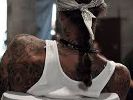Eye For Film >> Movies >> The Work (2017) Film Review
The Work
Reviewed by: Jennie Kermode

What is prison for? The classic answer to this question focuses on three things: protection for the public, punishment of the criminal, and reform or rehabilitation of the criminal. In most social and political discussion, however, the focus is on the first two. There isn't much public confidence in reform, and there's some justification for that: even if it's properly resourced (which is rare), no known therapy consistently gets results over 80% with any type of criminal. Except one.
It began in 1997 when a prisoner began reading psychology books and developed the idea that he could do something to help himself and his fellow prisoners. Since then it has become a steadily growing phenomenon, expanding outwards into other prisons. We don't get much history in this documentary, but what we do get is an extraordinarily intimate look at 'the work' in action. A group of men who consider themselves at risk of acting violently or ending up in jail journey to New Folsom Prison to begin four days of intensive therapy managed entirely by inmates. Although each of them feels he needs to change his life, they have varying degrees of scepticism about the process. Some are reluctant to submit to it or hesitant to undertake the hard work involved, hiding behind a veneer of smugness or outright mockery. Although some of the prisoners are participating in the process for the first time, they've all seen this attitude before.

"It's like looking into a mirror," say the prisoners dealing with one man, whom they describe as "a real live wire". There's affection and amusement in their voices. Some of these men are serving sentences of more than 70 years. Although it's never discussed directly, it's clear that the work has given their lives new meaning. It's hard - emotionally draining for them as well as for those seeking help - but meaningful challenges and peaks of emotion are two of the hardest things to find on the inside, and one of them explains that it makes him feel alive.
The process begins with simple questions: what do the visitors want to get out of the process, what do they identify as the problems in their lives? Answering these things honestly is tough - most of the men raise things they say they've never discussed with anyone before - but the prisoners are such figures of toughness that it is perhaps less shameful to break down in front of them than in front of an ordinary therapist in some pastel-walled office. They create a space where it's safe for men to express emotion. This can be pain - one man just wants to feel free to grieve over the death of his sister - or it can be rage, long-repressed and smouldering, the kind of rage that too often results in a casually disrespectful stranger ending up in hospital. Here, there are enough big guys to hold a man down when he explodes emotionally, so he can let go without fear.
Over the course of the film, we see men travel right to the edge. Every one of them will emerge transformed - even the one who doesn't initially think his problems are all that severe. The importance of cinema hinges on its power to communicate, and here we see human expression at its most raw. It is impossible to remain unmoved - or to leave the film without a deep respect for those brave enough to let themselves be exposed onscreen in this way.
Although these are mostly working class men, they have a sophisticated understanding of the process and of the societal problems - especially in terms of how masculinity is understood - that it routinely needs to address. Abusive or absent fathers come up frequently in discussions of childhood. The prisoners feel that in many ways they are taking on a paternal role.
Filming almost entirely within one room over just four days, directors Jairus McLeary and Gethin Aldous have captured something remarkable.
Reviewed on: 21 Nov 2017
















